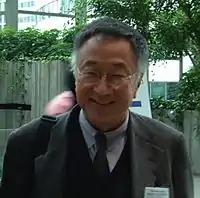Paul Terasaki
Paul Ichiro Terasaki (September 10, 1929 – January 25, 2016) was an American scientist. He worked in the field of human organ transplant technology. He was the Professor Emeritus of Surgery at UCLA School of Medicine. Terasaki was born in Los Angeles, California.

Terasaki in March 2014
In 1964, Terasaki developed the microcytotoxicity test. This is a tissue-typing test for organ transplant donors and recipients. It required only 1 microliter of antisera used to identify human leukocyte antigens (HLA).[1]
Terasaki died on January 25, 2016 after a long illness in Beverly Hills, California. He was aged 86.[2]
References
- J. Michael Cecka (14 Aug 2003). "Interview with Dr. Paul I. Terasaki" (PDF). American Journal of Transplantation. 3 (9). American Society of Transplantation and the American Society of Transplant Surgeons: 1047–1051. doi:10.1034/j.1600-6143.2003.00194.x. PMID 12919082. S2CID 70458064. Retrieved 2008-12-13.
- Renaud, Jean-Paul; Wolpert, Stuart. "Paul Terasaki, 86, transplant medicine pioneer, philanthropist, UCLA faculty member and alumnus". newsroom.ucla.edu. UCLA. Retrieved 2016-01-28.
Other websites
- "Paul I. Terasaki - Real People". Discover Nikkei. International Nikkei Research Project. Retrieved 2008-12-13. See also its links to oral history video clips.
This article is issued from Wikipedia. The text is licensed under Creative Commons - Attribution - Sharealike. Additional terms may apply for the media files.